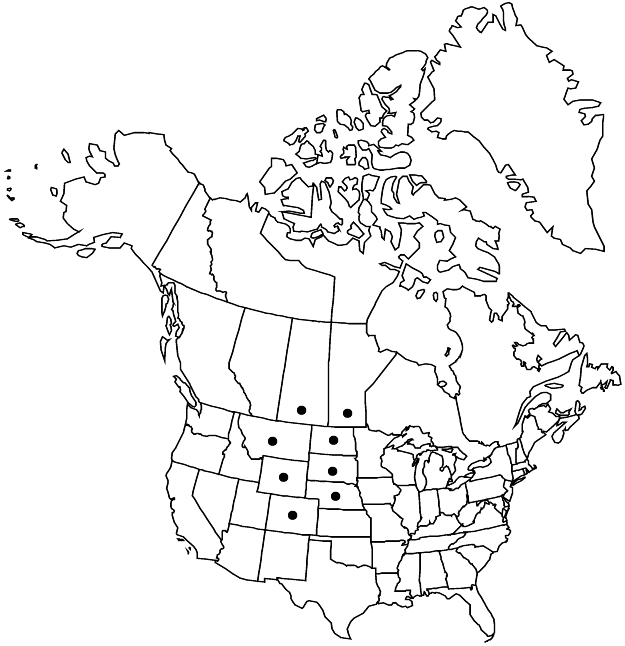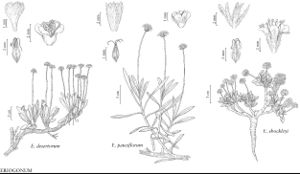Difference between revisions of "Eriogonum pauciflorum"
Fl. Amer. Sept. 2: 735. 1813.
FNA>Volume Importer |
FNA>Volume Importer |
||
| Line 36: | Line 36: | ||
|elevation=600-1800 m | |elevation=600-1800 m | ||
|distribution=Man.;Sask.;Colo.;Mont.;Nebr.;N.Dak.;S.Dak.;Wyo. | |distribution=Man.;Sask.;Colo.;Mont.;Nebr.;N.Dak.;S.Dak.;Wyo. | ||
| − | |discussion=<p><i>Eriogonum pauciflorum</i> is the common, matted wild buckwheat on the Great Plains. The species occurs in southern Manitoba and Saskatchewan, northeastern Colorado, Montana, western Nebraska, North Dakota, Nebraska, South Dakota, and Wyoming. Plants from southeastern Wyoming, northeastern Colorado and western Nebraska have somewhat broader leaf blades (spatulate to elliptic rather than linear-oblanceolate to oblanceolate) that are densely tomentose to lanate on both surfaces (rather than loosely tomentose abaxially and less so or glabrous adaxially). Such plants have been distinguished as var. gnaphalodes. This expression would be worthy of a place in the rock garden. A hybrid between <i></i>var.<i> pauciflorum</i> and <i>E. effusum</i> has been named E. ×nebraskense Rydberg (see 2. <i>E. effusum</i>). The hybrid is known from Weld County, Colorado, Cheyenne, Dawes, Kimball, and Sioux counties, Nebraska, and Converse and Platte counties, Wyoming.</p> | + | |discussion=<p><i>Eriogonum pauciflorum</i> is the common, matted wild buckwheat on the Great Plains. The species occurs in southern Manitoba and Saskatchewan, northeastern Colorado, Montana, western Nebraska, North Dakota, Nebraska, South Dakota, and Wyoming. Plants from southeastern Wyoming, northeastern Colorado and western Nebraska have somewhat broader leaf blades (spatulate to elliptic rather than linear-oblanceolate to oblanceolate) that are densely tomentose to lanate on both surfaces (rather than loosely tomentose abaxially and less so or glabrous adaxially). Such plants have been distinguished as var. gnaphalodes. This expression would be worthy of a place in the rock garden. A hybrid between <i></i></i>var.<i><i> pauciflorum</i> and <i>E. effusum</i> has been named E. ×nebraskense Rydberg (see 2. <i>E. effusum</i>). The hybrid is known from Weld County, Colorado, Cheyenne, Dawes, Kimball, and Sioux counties, Nebraska, and Converse and Platte counties, Wyoming.</p> |
|tables= | |tables= | ||
|references= | |references= | ||
| Line 60: | Line 60: | ||
|publication year=1813 | |publication year=1813 | ||
|special status= | |special status= | ||
| − | |source xml=https://jpend@bitbucket.org/aafc-mbb/fna-data-curation.git/src/ | + | |source xml=https://jpend@bitbucket.org/aafc-mbb/fna-data-curation.git/src/f6b125a955440c0872999024f038d74684f65921/coarse_grained_fna_xml/V5/V5_554.xml |
|subfamily=Polygonaceae subfam. Eriogonoideae | |subfamily=Polygonaceae subfam. Eriogonoideae | ||
|genus=Eriogonum | |genus=Eriogonum | ||
Revision as of 20:09, 24 September 2019
Herbs, loosely matted, usually scapose, 0.5–2 × 0.5–3 dm, tomentose, grayish. Stems spreading, usually with persistent leaf bases, up to 1/4 height of plant; caudex stems matted; aerial flowering stems scapelike, erect or nearly so, slender, solid, not fistulose, 0.3–2 dm, tomentose. Leaves fasciculate in terminal tufts, sometimes 1 per node and sheathing up stem 1–5 cm; petiole 1–5 cm, tomentose to lanate; blade linear-oblanceolate to oblanceolate or narrowly spatulate to elliptic, 1–4 × 0.1–1 cm, grayish- or whitish-tomentose abaxially, less so to subglabrous (or rarely glabrous) adaxially or white-lanate on both surfaces, margins plane. Inflorescences capitate, subcapitate, or cymose-umbellate, 1–5 × 1–2 cm; branches absent or dichotomous; bracts 2–6, linear to lanceolate, scalelike to semileaflike, 1.5–20 × 1–5 mm. Peduncles absent. Involucres 1 per node or 2–5(–7) per cluster, narrowly turbinate, (3.5–)4–5 × (1.5–)2–3 mm, rigid, floccose to tomentose; teeth 5, erect, 0.5–0.8 mm. Flowers 2–2.5 mm; perianth whitish brown to rose, pubescent, rarely glabrous; tepals connate proximal 1/3, monomorphic, oblong; stamens exserted, 2.5–3 mm; filaments pilose proximally. Achenes light brown to brown, 2–2.5 mm, glabrous.
Phenology: Flowering May–Sep.
Habitat: Clay to gravelly flats, washes, and slopes, grassland and sagebrush communities, juniper woodlands
Elevation: 600-1800 m
Distribution

Man., Sask., Colo., Mont., Nebr., N.Dak., S.Dak., Wyo.
Discussion
Eriogonum pauciflorum is the common, matted wild buckwheat on the Great Plains. The species occurs in southern Manitoba and Saskatchewan, northeastern Colorado, Montana, western Nebraska, North Dakota, Nebraska, South Dakota, and Wyoming. Plants from southeastern Wyoming, northeastern Colorado and western Nebraska have somewhat broader leaf blades (spatulate to elliptic rather than linear-oblanceolate to oblanceolate) that are densely tomentose to lanate on both surfaces (rather than loosely tomentose abaxially and less so or glabrous adaxially). Such plants have been distinguished as var. gnaphalodes. This expression would be worthy of a place in the rock garden. A hybrid between var. pauciflorum and E. effusum has been named E. ×nebraskense Rydberg (see 2. E. effusum). The hybrid is known from Weld County, Colorado, Cheyenne, Dawes, Kimball, and Sioux counties, Nebraska, and Converse and Platte counties, Wyoming.
Selected References
None.
